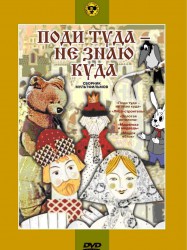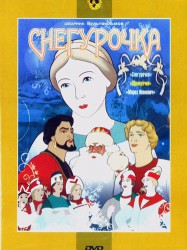Le Prince, le Cygne et le Tsar Saltan est un film de genre Fantasy réalisé par Ivan Ivanov-Vano avec Boris Novikov
Le Prince, le Cygne et le Tsar Saltan (1984)

Si vous aimez ce film, faites-le savoir !
The Tale of Tsar Saltan (Russian: Ска́зка о царе́ Салта́не; tr.:Skazka o tsare Saltanye) is a 1984 Soviet traditionally animated feature film directed by Lev Milchin and Ivan Ivanov-Vano and produced at the Soyuzmultfilm studio. It is an adaptation of the poem of the same name by Aleksandr Pushkin. There are few words in the film besides those of the poem itself, which is read from beginning to end by the narrator and the voice actors. Some portions of the poem are skipped.
Here is how the director Yuriy Norsteyn spoke of Ivan Ivanov-Vano, mentioning this animated film:" Ivan Ivanov-Vano the first used motives and methods of folk art in animation. Study in Vkhutemas, education in traditions of the Russian vanguard, excellent knowledge of world art culture — all this affected in his creativity. From the point of view of art criticism mechanics, it would be possible to call him the formalist, he wasn't afraid to experiment. "The Humpbacked Horse" which became classics was such director's experiment. In it Ivanov-Vano connected everything: love to the Russian culture, poetry, knowledge of a profession, good possession of all arsenal of animation of that time. It turned Disney's technology into powerful action — the Russian movie. Here I was, of course, and a merit of the artist, Lev Milchin whom he didn't leave all life. "The Tale Tsar Saltan" became their latest work. It was the ideal tandem — irrepressible nature, the person soldier, the fanatic, the tyrant Vano and the intellectual to the core who wasn't affording anything superfluous, but everything Milchin, understanding, sharp to grotesque. For several decades its elements, its native habitat was the Russian fairy tale."
Synopsis
Par une froide nuit d’hiver, le tsar voyage en carrosse lorsqu’il entend le chant délicieux qui provient d’une maison où vivent trois sœurs et leur mère. Il rentre au moment où elles discutent de ce qu’elles feraient si elles étaient tsarines : tandis que les deux premières rêvent d’avoir une vie de rêve, la troisième, qui est bien plus belle que ses sœurs, déclare qu’elle donnerait un fils au tsar. En entend cela, ce dernier lui demande de l’épouser sur le champ et elle accepte, au grand dam de ses sœurs jalouses qui sont néanmoins invitées à séjourner à la cour avec leur mère.Acteurs

Boris Novikov
(Knyaz Gvidon (voice))

Lyudmila Ivanova
(Tsarevna Lebed (voice))
Commentaires
Postez un commentaire :
Suggestions de films similaires à Le Prince, le Cygne et le Tsar Saltan
Il y a 0 films ayant les mêmes acteurs, 8 films avec le même réalisateur, 17136 ayant les mêmes genres cinématographiques (dont 635 ayant exactement les mêmes 3 genres que Le Prince, le Cygne et le Tsar Saltan), 5112 films qui ont les mêmes thèmes, pour avoir au final 70 suggestions de films similaires.Si vous avez aimé Le Prince, le Cygne et le Tsar Saltan, vous aimerez sûrement les films similaires suivants :

Le Petit Cheval bossu (1947)
, 57minutesRéalisé par Ivan Ivanov-Vano
Origine Russie
Genres Fantasy, Aventure, Animation
Thèmes Mise en scène d'un animal, Féminisme, Magie, Les chevaux, Politique, Films pour enfants, Mise en scène d'un mammifère
Acteurs Anatoly Kubatsky
Note73%





Influencé par un conseiller jaloux, le Tsar cherche à mettre à l'épreuve Ivan le Benêt, un jeune garçon apparemment doté de pouvoirs exceptionnels, en lui confiant des missions à première vue impossibles. Malgré les tracasseries incessantes de ses deux frères, le héros relève pourtant ces défis avec succès, avec l'aide d'un petit cheval bossu volant qu'il a reçu en cadeau. Cet animal magique lui permet notamment d'atteindre un château, de tourner en ridicule le tsar, bête et méchant, ainsi que ses avides courtisans. Transformé en un beau jeune homme, il délivre la princesse qui était prisonnière. Elle lui donne son cœur et il l'épouse.
 , 1h7
, 1h7Réalisé par Ivan Ivanov-Vano
Genres Fantasy, Aventure, Animation
Thèmes Films pour enfants
Acteurs Georgy Vitsin, Evgueni Iakovlevitch Vesnik, Sergey Martinson
Note71%





D’après le conte "La clé d'or, ou les aventures de Bouratino" d’A. Tolstoï qui s’inspira du célèbre roman “Les Aventures de Pinocchio” de Carlo Collodi. Papa Carlo fabrique dans un morceau de bois un pantin qu’il nomme Bouratino. Joyeux, impertinent, bruyant et crédule, Bouratino fait la connaissance des marionnettes du méchant Karabas-Barabas, va en quête de la mystérieuse clé d'or et, aidé de ses nouveaux amis, lutte contre Karabas-Barabas, son fidèle ami Douremar et deux escrocs qui courent après les quelques pièces de monnaie appartenant à Bouratino.

Podi tuda ne znayu kuda (1966)
, 52minutesRéalisé par Ivan Ivanov-Vano
Genres Fantasy, Animation
Thèmes Films pour enfants
Acteurs Georgy Vitsin
Note70%






Douze mois (1956)
, 56minutesRéalisé par Ivan Ivanov-Vano
Origine Russie
Genres Fantasy, Animation
Thèmes Films pour enfants
Acteurs Tatyana Barysheva, Erast Garine
Note73%





Lorsqu'une jeune reine exigeante offre un panier rempli d'or à quiconque lui apportera un bouquet de perce-neige pour le Nouvel An, une femme cupide envoie sa belle-fille à la recherche des fleurs au fond de la forêt, bien persuadée cependant qu'elle n'y parviendra pas et mourra de froid. Pourtant les Douze mois la sauvent d'une mort certaine en créant le printemps autour d'elle, ce qui lui permet de revenir avec les fleurs. Mais l'héroïne n'est pas au bout de ses peines...

La fille des neiges (1952)
, 1h5Réalisé par Pavel Kadotchnikov, Ivan Ivanov-Vano
Origine Russie
Genres Fantasy, Animation
Thèmes La musique, Musique, Adaptation d'un opéra, Films pour enfants
Acteurs Pavel Kadotchnikov
Note69%





L'hiver s'achève, et le Ded Moroz se prépare à rentrer dans le nord. Mais sa fille au cœur glacé Snégourotchka après avoir entendu les chansons de Lel (le dieu slave de l'amour et du mariage) veut rester au royaume de Berendeï. Elle demande à sa mère — la belle femme le Printemps — fondre son cœur...

Les Bisounours, le film (1985)
, 1h15Réalisé par Arna Selznick
Origine Canada
Genres Science-fiction, Comédie, Fantasy, Aventure, Animation
Thèmes Mise en scène d'un animal, L'enfance, Jeu, Jouet, Films pour enfants
Acteurs Mickey Rooney, Jackie Burroughs, Georgia Engel, Billie Mae Richards, Eva Almos, Hadley Kay
Note56%





Dans ce film, Monsieur Cherrywood (le concierge d'un orphelinat) parle de l'histoire des Bisounours qui aident deux enfants maladroits, Kim et Jason, à affronter le jeune disciple d'un grand magicien, Nicholas, qui a récupéré les pouvoirs maléfiques d'un vieux livre pour faire le mal.

ドラえもん のび太の宇宙小戦争 (1985)
, 1h37Genres Science-fiction, Fantasy, Aventure, Animation
Thèmes Mise en scène d'un animal, Mise en scène d'un chat, Extra-terrestres, Space opera, Films pour enfants, Extraterrestre
Acteurs Kaneta Kimotsuki, Ryūsei Nakao, Keiko Han
Note71%





Papi, the tiny president of a faraway planet, escapes to Earth to avoid being captured by the military forces that took over.

ドラえもん のび太の魔界大冒険 (1984)
, 1h37Genres Science-fiction, Fantasy, Aventure, Animation
Thèmes Mise en scène d'un animal, Mise en scène d'un chat, Films pour enfants
Acteurs Kaneta Kimotsuki, Mami Koyama, Tadashi Nakamura, Toshiya Ueda, Genzō Wakayama, Keiko Yokozawa
Note69%






Jan Zonder Vrees (1984)
, 1h18Genres Fantasy, Aventure, Animation
Thèmes Films pour enfants
Acteurs Jan Decleir, Ann Petersen, Ward de Ravet
Note69%





The story begins when John resigns his job as a sailor and goes back home to his grandmother. After seeing all of the burglars in town, he takes it upon himself to rid the town of all evildoers. After he's become the word around town, he lets everyone in the town know that he has no fear. His cousin, in jealousy of John's newfound fame decides to disprove this statement, by showing up at the local graveyard dressed as a ghost. John, annoyed with the ghost's presence, accidentally kills his cousin. Realizing his mistake, he reports it, only to be arrested and sentenced to prison. However, he easily escapes the prison guards and goes about his ways. He ends up soon after in the countryside, to find a servant being beaten by his master. After showing the boss the error of his ways, the boss recognizes his goodheartedness and sends him on a quest to destroy a shape shifting evil water demon called Kludde,with the servant as his sidekick. John, true to his claim of having "no fear" begins his quest with good spirits.

Le Magicien d'Oz (1982)
, 1h18Réalisé par Fumihiko Takayama
Genres Fantasy, Aventure, Animation
Thèmes Féminisme, Magie, Monde imaginaire, Le pays d'Oz, Politique, Films pour enfants
Acteurs Mari Okamoto, Ichirō Nagai, Masashi Amenomori, Jōji Yanami, Naoki Tatsuta, Taeko Nakanishi
Note65%





Alors que son oncle et sa tante sont partis pour la ville, la jeune Dorothée est emportée avec sa maison par un puissant cyclone. A son réveil, elle découvre qu'elle est arrivée dans un étrange pays du nom d'Oz...
 Connexion
Connexion